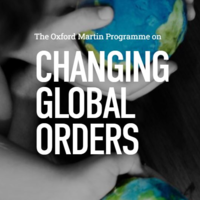The Oxford Martin Programme on Changing Global Orders

The Oxford Martin Programme on Changing Global Orders brings together world-leading historians and top academic analysts of the history and development of global order with prominent policy-makers who are confronting current shocks and striving to chart a better future. Together they will seek to improve the conditions for more collaborative, cohesive and coordinated institutional responses to the global shocks that the 21st century has in store for us all.
Visit the project website here: https://changingglobalorders.web.ox.ac.uk/
With the world reeling from the ongoing impacts of climate change and international conflict, as well as COVID-19 and its economic consequences, we are in a unique moment to rethink the nature of global order and the institutional pathways of global governance. Different national, regional, international and intergovernmental organizations (IOs), including an array of NGOs, are currently in the process of learning, adapting and interacting with each other in response to the global conditions we are experiencing. International institutions are under severe stress and critiques abound. We cannot make any easy assumptions as to whether the sorts of global order that many consider indispensable are, in fact, likely to be possible.
But the future is not written on a blank slate. Rather the past is a rich resource that can help us to locate the barriers to effective cooperation in times of protracted turbulence and upheaval and identify politically-grounded pathways to overcome them.
These historically-established pathways have – and continue to – animate and constrain the management of shocks, yet in ways which are insufficiently acknowledged and understood by both scholars and policy-makers. A better understanding of these pathways will assist future solutions.
From refugee crises, conflicts, and pandemics, to financial crashes, natural disasters and disruptive technological innovation we cannot escape the fact that, in the future, global shocks will reshape the world in which we live. We may not be able to anticipate the exact form, size or impact the next global shock may take. But a closer and more critical study of the past can open our minds to the range of possible future scenarios as well as point policy-makers to better and worse ways of addressing them.
The Oxford Martin Programme on Changing Global Orders brings together world-leading historians and top academic analysts of the history and development of global order with prominent policy-makers who are confronting current shocks and striving to chart a better future. Together they will seek to improve the conditions for more collaborative, cohesive and coordinated institutional responses to the global shocks that the 21st century has in store for us all.
More specifically, the programme will use cutting-edge historical and social science scholarship to draw on the insights from the past in order to help locate the barriers to effective cooperation and then identify politically-grounded pathways to overcome them. The issue of global shocks will be presented as systemic and on a spectrum of ‘turbulence’, enabling it to trace and understand the links between individual crises and ongoing disruption.



